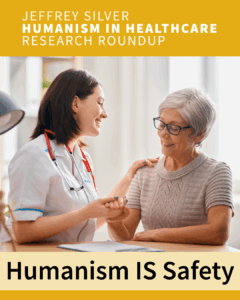This post is part of our series of Research Roundups — a list of recently published studies on humanism in medicine. If you would like to be notified each time a Research Roundup is published, send an email to bking@gold-foundation.org with the subject line “Subscribe RR”.
 The impact of simulated medical consultations on the empathy levels of students at one medical school
The impact of simulated medical consultations on the empathy levels of students at one medical school
Schweller M, Costa FO, Antônio MA, Amaral EM, de Carvalho-Filho MA. Acad Med. 2014 Feb 19. [Epub ahead of print]
Medical students completed the medical student version of the Jefferson Scale of Physician Empathy before and after simulated medical consultations with standardized patients, followed by an in-depth debriefing about the patients’ feelings related to their disease. Results showed that empathy scores increased and that the exercise prompted important discussions.
Therapeutic benefit of the anesthesiologist-patient relationship
Egbert LD, Jackson SH. Anesthesiology. 2013 Dec;119(6):1465-8.
Researchers found that patients receiving pentobarbital 1 hour before an operation became drowsy but it could not be shown that they became calm. Patients who had received a visit by an anesthetist before their operation were not drowsy but were more likely to be calm on the day of operation.
Patients’ assessment of professionalism and communication skills of medical graduates
Abadel FT, Hattab AS. BMC Med Educ. 2014 Feb 11;14:28.
A cross-sectional study of patients and medical graduates showed that patients rated the graduates’ skills from 3.29 to 3.83 on a five-point Likert scale. They had high ratings on communication with patients and low ratings on patient-involvement in decision-making. Older patients tended to give higher ratings and patients with a higher education level tended to rate graduates lower.
Intervention to promote physician well-being, job satisfaction, and professionalism: A randomized clinical trial
West CP, Dyrbye LN, Rabatin JT, Call TG, Davidson JH, Multari A, Romanski SA, Hellyer JM, Sloan JA, Shanafelt TD. JAMA Intern Med. 2014 Feb [Epub ahead of print]
In a randomized clinical trial, physicians received 19 biweekly facilitated discussion groups incorporating elements of mindfulness, reflection, shared experience, and small-group learning for 9 months. Results showed that the intervention improved meaning and engagement in work and reduced depersonalization, with sustained results at 12 months after the study.
How does it really feel to be in my shoes? Patients’ experiences of compassion within nursing care and their perceptions of developing compassionate nurses
Bramley L, Matiti M. J Clin Nurs. 2014 Jan [Epub ahead of print]
In a qualitative study of patient interviews, researchers found that patients described three themes related to compassion: (1) knowing me and giving me your time, (2) understanding how it feels in my shoes and (3) compassionate communication as the essence of nursing.
Sounding narrative medicine: studying students’ professional identity development at Columbia University College of Physicians and Surgeons
Miller E, Balmer D, Hermann N, Graham G, Charon R. Acad Med. 2014 Feb;89(2):335-42.
After completing a required narrative medicine seminar, second year medical students participated in focus groups about their experiences. Students expressed that the work they had done had helped them further develop critical thinking and reflection skills.
And a publication from one of our Gold Humanism Scholars, Hedy Wald, PhD:
Electronic health record training in undergraduate medical education: Bridging theory to practice with curricula for empowering patient- and relationship-centered care in the computerized setting
Wald HS, George P, Reis SP, Taylor JS. Acad Med. 2014 Jan [Epub ahead of print]
Medical students require training to become skilled users of electronic health records and other healthcare IT, but formal pedagogy within undergraduate medical education (UME) is sparse. The authors describe bridging theory into practice with systematic longitudinal curriculum development for EHR training in UME at their institution, informed by Kern and colleagues’ curriculum development framework, narrative medicine, and reflective practice.


